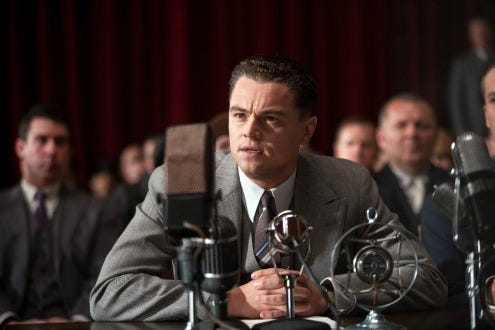J. Edgar

"J. Edgar" is a curiously flat biopic for one of the most polarizing figures of the 20th century. Depending on who you ask, J. Edgar Hoover was either one of the greatest innovators in the field of law enforcement or a power-mad tyrant. Clint Eastwood's new drama tends more toward the latter than the former, though it seems clear the great director has some admiration, or at least healthy respect, for Hoover's perseverance and resolve.
No one who becomes the head of a federal agency while still in his 20s, and remains in that post for nearly 50 years — transforming the very face of law enforcement in the process — can be easily dismissed.
The film's period production values are stupendous, seamlessly transitioning from 1919 to the early 1970s without ever missing a beat of authenticity. The suits, cars, decor and more appear spiffy and spot-on without screaming "Look at me!"
The makeup used to transform Leonardo DiCaprio into Hoover is also pretty spectacular. The actor bears little resemblance to the real man, but by giving him woolly hair, a thickening of the middle (some weight gain by DiCaprio augmented by padding, methinks) and enlarging his pupils, they manage to suggest the essence of Hoover without attempting a rote imitation.
DiCaprio's performance is solid, too, portraying a man driven to continually find fault in others as a defense mechanism for avoiding confrontation with his own weaknesses. There's even a scene suggesting that young Johnny Hoover stammered as a child and acquired his iconic rapid-fire speech pattern through endless drills to correct his stutter. His mother (Judi Dench) appears in fits and starts, as a devout woman who pushed her son in ways subtle and not-so-subtle to always strive for more.
I cannot say I think much of the central theme of Dustin Lance Black's screenplay, which is that Hoover was a closeted gay man who had a lifelong platonic love affair with Clyde Tolson (Armie Hammer), his number two at the Federal Bureau of Investigation. Tolson is portrayed as a fairly progressive and self-aware gay man, who acknowledges his feelings for Edgar to himself even as he is savvy enough to realize he can't do so publicly.
There's one big scene where Tolson throws a fairly extreme hissy fit when Hoover tells him he's thinking of marrying an actress, and they have a fistfight while dressed in their nightclothes that turns into a makeout session and a huge emotional explosion. It's a bold scene, full of energy and exuberance, and feels like total bullshit.
The historical case that Hoover was homosexual is sketchy at best — he and Tolson spent most of their meals and vacations together, etc. Most biographies say no, and Mark Felt, the number three man at the FBI (who later revealed himself to be the infamous "Deep Throat" to Woodward & Bernstein) insisted their affection was genuine but brotherly.
The whole cross-dressing thing — which is absurdly addressed in a scene where Hoover mourns in his mother's dress after her death — is likely a figment. It was based on an account by one woman, a notorious socialite who was a convicted perjurer, but has managed to seep into the communal consciousness as truth.
Personally, I don't find it very interesting to explore if Hoover was gay or not. Even if he did secretly favor men, it would be the least interesting thing about him as a person. The secretive, power-hungry figure who dangled presidents and others wandering the corridors of power on a string is so compelling a subject, the matter of who he slept with pales in comparison.
Eastwood and Black spend most of the first part of the movie exploring this towering figure and the bulk of the latter half doting on the gay question. The timeline jumps around liberally, with a lot of too-clever jump cuts showing young Hoover and Tolson stepping into an elevator and their older selves exiting, etc.
"J. Edgar" is a fine-looking movie and generally well-acted, too. Though some parts seem oversized, others are desperately short-shrifted. The most notable is Helen Gandy (Naomi Watts), whom young Hoover admired for her organizational skills and proposed marriage to on their third date. She demurred, but agreed to become his personal secretary, a position she would hold for the next five decades.
Gandy is omnipresent but unimportant, someone who lurks in the background until the filmmakers feel a need for Hoover to have a moment of self-reflection. Then Gandy is trotted in with her Steno pad and concerned expression to facilitate some convenient emoting.
My problem with this movie is it wants to exploit the shadowy whisperings about Hoover's personal life to paint a skewed portrait of his public one. Rumors, guilt by association and fleeting, surreptitious observations are an unreliable way to truly know a man. It's notable that these are the same sort of underhanded tactics Hoover himself used to gain and leverage power to wield according to his own interpretation of morality.
3 Yaps

